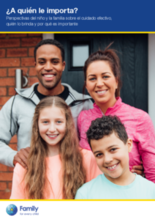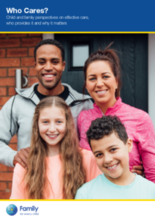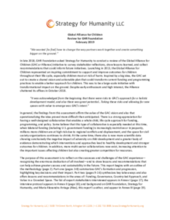This country page features an interactive, icon-based data dashboard providing a national-level overview of the status of children’s care and care reform efforts (a “Country Care Snapshot”), along with a list of resources and organizations in the country.
demographic_data
childrens_living_arrangement
children_living_without_bio
adoption
social_work_force
key_stakeholders
Key Stakeholders
Add New DataOther Relevant Reforms
Add New Datadrivers_of_institutionalisation
Drivers of Institutionaliziation
Add New Datakey_research_and_information
Key Data Sources
Add New DataReport on National Assessment of Centres caring for Children with Disabilities in Rwanda
National Integrated Child Rights Policy
Country Care Review: Rwanda
Prevalence and number of children living in institutional care: global, regional, and country estimates
The Way Forward Project Report
Community-Based Child Protection Mechanisms in Refugee Camps in Rwanda: An Ethnographic Study
Displaying 81 - 90 of 191
Pese a que hay un consenso sobre la importancia del cuidado efectivo en las familias para los niños, existe una falta de discusión y acuerdo sobre los componentes precisos de este cuidado. Este informe contribuye a debatir sobre este importante tema al proporcionar perspectivas de los grupos focales con 198 niños y 81 adultos de Brasil, Colombia, Egipto, México, Rusia, Ruanda y Zimbabue.
There is extensive research demonstrating clearly the importance of a safe and caring family for child wellbeing and development. While there is consensus on the importance of effective care in families for children, there is a lack of discussion and agreement about the precise components of this care. This report contributes to debates on the components of family care by providing perspectives from nearly 200 children and over 80 adults from Brazil, Colombia, Egypt, Mexico, Russia, Rwanda and Zimbabwe. The report demonstrates that there are many commonalities in perspectives on and experiences of care across contexts.
This video explores Sugira Muryango: "Families Strengthening Intervention for Early Childhood Development: Alternative Delivery System of Poverty Reduction Strategies" in Rwanda—a project by the Research Program For Children and Adversity at the Boston College School of Social Work led by Salem Professor in Global Practice Theresa Betancourt.
In this blog post for Hope and Homes for Children, Stephen Ucembe writes about the damaging impacts of orphanages in the African context.
A pre-post design with 6–13-month follow-up assessed the feasibility and acceptability of a home-visiting intervention to promote early childhood development, improve parenting and shared decision-making, and reduce violence in impoverished Rwandan households.
An estimated 95,000 children in Rwanda are believed to have been orphaned during the genocide of 1994, according to this article from BBC News which tells the stories of some of those children, now adults, who are searching for living family members.
The main objective of the consultancy is to review and map the current tools and processes utilized under the Tubarerere Mu Muryango (TMM) programme, as well as within other programmes, and develop practical guidance, training materials and working tools to effectively apply the 12-TMM steps for reintegration of children with disabilities, starting from individual child and family assessment, community strengths/opportunities analysis, placement and post-reunification support.
The main objective of the consultancy is to review and map the current tools and processes utilized under the Tubarerere Mu Muryango (TMM) programme, as well as within other programmes, and develop practical guidance, training materials and working tools to effectively apply the 12-TMM steps for reintegration of children with disabilities, starting from individual child and family assessment, community strengths/opportunities analysis, placement and post-reunification support.
The purpose of this assessment is to reflect on the successes and challenges of the Global Alliance for Children (GAC) experience, a large-scale initiative to support and improve outcomes for children throughout their life cycle, especially children most at risk of harm.
"Since 2013, 3,151 out of 3,323 children living in 33 orphanages have safely been placed into family based care through the ‘Tubarere Mu Muryango’ program /Let’s Raise Children in the Family (TMM), implemented by the Government of Rwanda in partnership with UNICEF and different NGOs with financial support from USAID," according to this article from the New Times.



